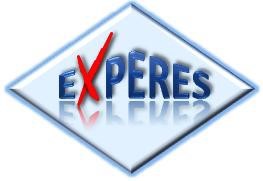EXPERES - Les TICE appliquées à l'expérimentation scientifique
Transnational cooperation project on capacity-building in the field of higher education in Morocco (561551-EPP-1-2015-1-ES-EPPKA2-CBHE-SP).

Scientific coordinator: Prof. Elena Pacetti
Project Team: Luigi Guerra, Maurizio Betti, Alessandro Soriani e Prof. Barbara Pecori, Giulia Tasquier (DIFA)
Applicant: University of Murcia (ES)
Partners from Europe Coordinator: Kungliga Tekniska Hoegskolan (SE), Erasmus Expertise (FR), Alma Mater Studiorum - Università di Bologna (IT), Universidad de Vigo (ES), Universidad de Leon (ES), Université IBN TOFAIL,
Parteners from Marocco Coordinator: Université IBN Zohr, Université Cadi Ayyad, Université Sultan Moulay Slimane, Université Abdelmalek Essaâdi, Université Mohammed V, Université Mohammed Premier, Université Moulay Ismail, Université Sidi Mohammed Ben Abdellah, Université Hassan II, Université Hassan 1er, Université Chouaïb Doukkali, Ministère de l’Enseignement Supérieur Marocain
N.r Partners: 19
Partners’ Countries: IT, ES, FR, SE, MA
UNIBO’s role: Partner
Project Duration (in months): 36
Start Date: 15/10/2015
End Date: 14/10/2018
Status: closed
Total Budget: 832.833 euro
Unibo Budget: 25.455 euro
Project’s Topics: Modernisation of curriculum by developing new and innovative courses and methodologies
Description: The Experes project, funded by the European Commission under the Erasmus Plus – capacity programme, involves 6 European institutions, 13 Moroccan institutions. It started in October 2015 and it ended in October 2018. Among the basis of the project we can highlight the following aspects taken from the proposal itself:
“Information and knowledge technologies have taken on considerable importance in recent years as they save time, reduce space constraints, use of expensive instrumentation, management constraints, etc ... They also offer the possibility to use new flexible and adaptable learning methodologies, taking advantage of the interactive functionality of computer learning devices and therefore also allow collaborative work based on the abundance of information available online. While it is true that there are sites that promote e-learning in the field of theoretical teaching, online scientific experimentation is also a growing phenomenon. This last aspect allows the students to carry out or to follow experiments in remote through a connected device, also in the Moroccan universities of belonging. The main objective of the project is to implement an e-learning platform to support laboratory work in the physical sciences studies. The platform supports different training offers of simulated experiments and allows a higher quality of students' learning because they can repeat virtual experiments as often as necessary, at any time and from any place.”
The project for the University of Bologna is led by the Department of Education Sciences in collaboration with the Department of Physic.
Contacts
-
Associate Professor
Dipartimento di Scienze Dell'Educazione "Giovanni Maria Bertin" - EDU
Via Filippo Re 6
Bologna (BO)
Tel: +39 051 20 9 1629